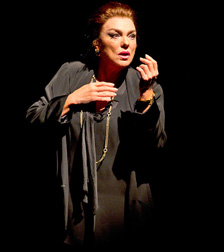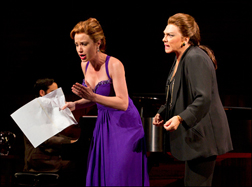|
Lucy KomisarRiveting “Master Class” shows Maria Callas dominating music but not her own life
Maria Callas’ brilliance, as articulated
by her dazzling stand-in Tyne Daly, was as much about discipline
and courage, presence and presentation, as about hitting the
right notes. Playwright Terrence McNally shows that through
an imagined master class Callas gives late in her career. Working
with students, she focuses on what makes a great star rather
than a skilled performer. But McNally also creates a feminist
parable of a woman who sold her soul for the lifestyle offered
by a billionaire.
That is why it is so strange to see her relationship with the coarse shipping tycoon Aristotle Onassis, who declares, “I bought you. You give class. I give you my wealth. You give me respect.” And, with some irony, since he in effect did the same, “The snobs want to take you to dinner.” Director Stephen Wadsworth, shifting Callas’ demeanor, lets us ponder the juxtaposition of her two conflicting elements. Her memories of triumph are mixed with desperation at her relationship to Onassis. There was no love between them. Onassis wants her to have an abortion or he will leave her. She wants to marry him. From Tosca, she sings “Ho dato tuto a te.” I have given you everything. Why did she take up with him? She was a world-famous singer married to a wealthy industrialist. Why did she stay with him? A woman who was dominant in her career did not dominate her own life. Callas as manipulated by Onasis reverses roles as Callas, the charming, assertive, self-centered, bully to her students. You don’t get a sense of how they took that, but it is a joy to see and hear a singer such as Sierra Boggess, the student soprano, give a brilliant rendition of Lady Macbeth. Daly herself sings a few fine notes at the end. But the lesson, it turns out, is about more than music.
| lobby | search
| home | cue-to-cue |
discounts | welcome | film
| dance | reviews
| |
||||



